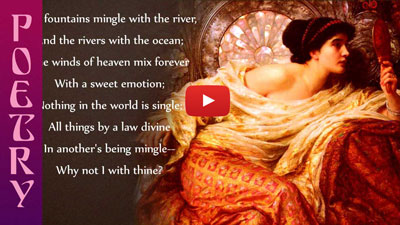Lines of high Romance (with a smile)
Transcript - Love's Philosophy
The fountains mingle with the river,
And the rivers with the ocean;
The winds of heaven mix forever
With a sweet emotion;
Nothing in the world is single;
All things by a law divine
In another's being mingle--
Why not I with thine?
See, the mountains kiss high heaven,
And the waves clasp one another;
No sister flower could be forgiven
If it disdained its brother;
And the sunlight clasps the earth,
And the moonbeams kiss the sea;--
What are all these kissings worth,
If thou kiss not me?
And the rivers with the ocean;
The winds of heaven mix forever
With a sweet emotion;
Nothing in the world is single;
All things by a law divine
In another's being mingle--
Why not I with thine?
See, the mountains kiss high heaven,
And the waves clasp one another;
No sister flower could be forgiven
If it disdained its brother;
And the sunlight clasps the earth,
And the moonbeams kiss the sea;--
What are all these kissings worth,
If thou kiss not me?
Insights, themes and ideas for interpretation
● There are at least 3 versions of this poem at large, but the variations are minor and keep very much to the theme, which - to paraphrase - advocates a togetherness in nature and a universal coupling of forces, including those of lovers.
● Nothing in the world is single, the poet suggests. All things - rivers, flowers, lovers – even non-physical phenomena like sunlight or moonbeams tend to find an attraction to other things, and it is only right and proper, he suggests, that they (he and his prospective lover) do so, too. This is found in the rhetorical question at the end of the first stanza: ‘why not I with thine?’
● The word ‘kiss’ becomes more frequent as the poem progresses, suggesting a not-so-subtle process of seduction is taking place behind the reasoning. This culminates in the conclusion, voiced by the poet, that it would be simply wrong if the object of his desire does not surrender to this process and kiss him in return.
● It is odd, given Shelley’s supposed atheism, that in line 6 of the poem he refers to ‘a law divine.’ In an alternative version, line 7 he even has ‘in one spirit meet and mingle’ rather than in ‘another’s being mingle.’
● Ultimately, the poem is perhaps meant to be taken a little more lightly than some of his more complex works. It is a piece of gentle mischief, a satire on the sometimes overblown language of Romantic poetry - though it can also be viewed as a subtle critique on the use of the intellect to reinforce prejudices and desires – to get our own way through dubious processes of reasoning or belief.
● Nothing in the world is single, the poet suggests. All things - rivers, flowers, lovers – even non-physical phenomena like sunlight or moonbeams tend to find an attraction to other things, and it is only right and proper, he suggests, that they (he and his prospective lover) do so, too. This is found in the rhetorical question at the end of the first stanza: ‘why not I with thine?’
● The word ‘kiss’ becomes more frequent as the poem progresses, suggesting a not-so-subtle process of seduction is taking place behind the reasoning. This culminates in the conclusion, voiced by the poet, that it would be simply wrong if the object of his desire does not surrender to this process and kiss him in return.
● It is odd, given Shelley’s supposed atheism, that in line 6 of the poem he refers to ‘a law divine.’ In an alternative version, line 7 he even has ‘in one spirit meet and mingle’ rather than in ‘another’s being mingle.’
● Ultimately, the poem is perhaps meant to be taken a little more lightly than some of his more complex works. It is a piece of gentle mischief, a satire on the sometimes overblown language of Romantic poetry - though it can also be viewed as a subtle critique on the use of the intellect to reinforce prejudices and desires – to get our own way through dubious processes of reasoning or belief.
Technical info’
Type of Poem =
a short 'rhetorical' piece consisting of just two stanzas of eight lines.Rhyme Scheme =
ABAB CDCDMeter =
variableFictional Memoir
Georgian novel
Fictional Memoir
Victorian Gothic













